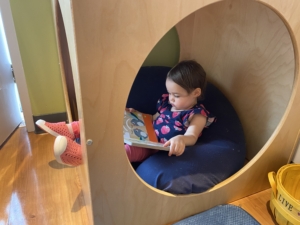February 8, 2022
“Education is a natural process carried out by the child and is not acquired by listening to words but by experiences in the environment.”
– Dr. Maria Montessori

As we welcome the new calendar year, and the second half of the school year, we might take a moment to reflect and assess our values and practices regarding toddlers. With the commercial stream of educational toys, beeping and talking, promising to make children faster, smarter and stronger, it can be difficult to fully appreciate the child in front of us.
However if we take a closer look, this time through a developmental lens, we can see that our children are in fact, more incredible than we even dare imagine. While toddlers meet ever changing daily challenges, our job stays the same—to observe and support them. We observe by watching quietly, without imposing our expectations, and see our children as they literally create themselves. We support them by providing a safe, engaging environment for them to work in, without interruption or commentary.
Two things we immediately see when observing toddlers, is that they are sensorial learners and that they are often in motion. They may spend a long time with a seemingly simple object, turning it over, banging it on the floor, smelling it, mouthing it, moving it from hand to hand, feeling its weight. They may try to take it apart or open it. And they may do this over and over again. It is sometimes hard to see this as time educationally spent, but this level of concentration and deep thinking is crucial to future academic skills. Following their lead with this knowledge, we can provide environments that interest and engage a toddler’s natural curiosity.
Toddlers are driven to practice and master skills towards independence. They are creatures of process not product, often having a greater threshold for failure than adults. They are critical thinkers, more interested in exploring how to open and close a box, than being entertained by a light up device. Children are drawn to concrete, realistic materials and activities, relevant to their world. They have strong opinions and interact deeply with what interests them, disregarding activities and people that are not.
When you read your toddler’s progress report in the coming days, keep in mind that cognitive development is not the same as academic checkpoints; That there are steps in physical development that precede toileting; That social awareness and niceties come after a sense of self. Our toddlers are more akin to an infant than a preschooler, yet present with emerging language, adaptability, physical and problem solving skills that demonstrate cognitive strength and a desire to explore and understand their world. Read the coming letters with an appreciation for how much your toddler brings to the table.